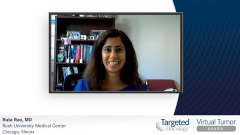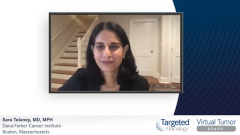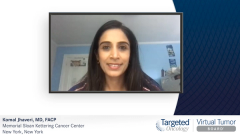
Case 1: Neoadjuvant Therapy for Early-Stage HER2+ Breast Cancer
Episodes in this series

Ruta Rao, MD: Let’s talk about how we would assess this patient’s risk for recurrence.
Komal Jhaveri, MD, FACP: When we’re thinking about the risk of recurrences, we are taking into account clinical pathological factors and tumor characteristics for the given patient: age, tumor size, nodal involvement, grade, ER/PR [estrogen receptor/progesterone receptor] positivity, and HER2 [human epidermal growth factor receptor 2] positivity. In this case, the patient is a young woman with a grade 3 tumor that is at least at 2 cm in size and is multifocal, both biopsy proven as node positive, ER/PR-negative, HER2-positive. Those are the criteria that we take into mind. Fortunately, her systemic staging does not show metastatic disease at this point, so we would still treat her for a curative intent in the early stage setting.
Ruta Rao, MD: Would you recommend neoadjuvant systemic therapy for this patient? Dr Tolaney, would you like to comment?
Sara Tolaney, MD, MPH: Yes. We’ve now seen data that show we can improve outcomes for our patients based on adapting therapy, based on response to preoperative therapy. It has shifted our practice so that we are looking to give preoperative therapy to the vast majority of our patients, so we can better understand how they respond in the preoperative setting and then potentially adapt in the adjuvant setting. My preference has been to use preoperative therapy for anyone who has a tumor that is over 2 cm in size or who has clinically node-positive disease. This particular patient would meet those criteria, so I would recommend preoperative systemic therapy. When it comes to making a decision about what to use, I have preferred using pertuzumab-based preoperative therapy for these patients knowing that adding pertuzumab to chemotherapy and trastuzumab is associated with improvements in pCR [pathologic complete response]. I’ve used pertuzumab-based chemotherapy preoperatively.
Ruta Rao, MD: What about the addition of an anthracycline? Is this something you would consider as 1 of your preoperative chemotherapy drugs?
Sara Tolaney, MD, MPH: I trained on the East Coast, and we’ve always had a bias toward the use of anthracyclines over the years. However, I have changed my practices and changed my ways. Over the last 2 to 3 years, I’ve shifted away from use of anthracycline, and the reason is that we initially had some data to suggest that nonanthracycline taxane-based chemotherapy seemed to be as good as anthracycline treatment. This was based on BCIRG 006, where we saw that TCH [docetaxel, carboplatin, trastuzumab] seemed to have similar disease-free survival to ACTH [doxorubicin, cyclophosphamide, paclitaxel, trastuzumab]. Even when I saw those data, I thought that the trial wasn’t powered for that comparison. It’s only 1 study, and we have multiple anthracycline-based trials, so I hadn’t initially fully shifted away from anthracyclines.
At ASCO [American Society of Clinical Oncology Annual Meeting] this year, we also saw updated data from the TRAIN-2 trial, which looked at preoperative anthracycline followed by taxane therapy vs taxane dual anti-HER2 therapy alone. We had previously seen similar pCRs between the 2 arms, but we now have 3-year disease-free survival, showing that both arms do exceedingly well. Even in the highest-risk patients, when you separated out disease-free survival by nodal involvement, you saw the same benefit, the same disease-free survival with anthracycline vs nonanthracycline therapy. We also saw more toxicity with anthracycline treatment, so there were higher rates of cardiac toxicity, higher rates of febrile neutropenia, and numerically more leukemia cases. In totality, seeing BCIRG 006 and TRAIN-2 again, it is hard to justify using anthracyclines anymore because we’ve been able to escalate our anti-HER2 therapy to improve outcomes. We need to think about de-escalating the chemotherapy and trying to decrease toxicity for patients. I would not use anthracyclines at this point, and for this particular patient, I would probably give TCHP [docetaxel, trastuzumab, pertuzumab, carboplatin].
Ruta Rao, MD: Great, thank you. Dr Jhaveri, what about you? Are there any particular patient situations in which you would consider an anthracycline?
Komal Jhaveri, MD, FACP: No. I completely agree with Dr Tolaney in that I was an avid anthracycline user, and it’s taken a long time for me to convert to thinking about nonanthracycline-based regimens. Having said that, something we do see in practice is with the rates of cardiotoxicity, which is what we talk about with anthracycline-based regimens and leukemia risks that are rare but real with these regimens. The toxicity that we see with TCHP [docetaxel, trastuzumab, pertuzumab, carboplatin] is significant as well. We sometimes see our patients struggle with neutropenia, fatigue, and many other adverse effects constitutionally, which can sometimes make even TCHP [docetaxel, trastuzumab, pertuzumab, carboplatin] challenging. They both have distinct toxicity profiles.
We have options. We have large bodies of data supporting anthracycline and nonanthracycline-based approaches. Our initial thinking on the East Coast, that every high-risk patient should be treated with an anthracycline, has certainly changed given the body of data that Dr Tolaney beautifully summarized. We had node-positive patients even in the BCIRG 006 trial, where we did not do head-to-head comparisons. But they at least did fairly well even with the highest-risk group in that trial and now with the TRAIN-2 study. These are reasonable options with reasonable toxicity profiles to discuss with our patient and make a patient-physician shared decision-making process. I don’t feel compelled to give anthracyclines anymore.
Transcript edited for clarity.














































